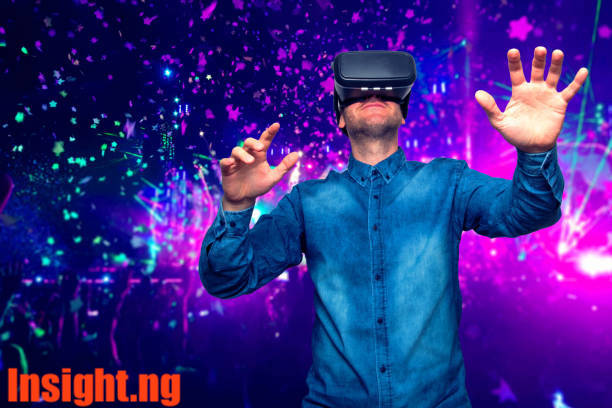In recent times, Nigeria has witnessed incredible advancements in the digital space. From e-commerce to the emergence of fintech companies, Nigeria is positioning itself as a virtual hub in Africa.
Amidst technological development, virtual reality stands out. As the technology becomes less expensive and reachable, virtual reality will be used in a much broader range of applications across all sectors and industries.
Virtual reality offers numerous advantages to Nigeria’s digital landscape. This article explores the benefits of virtual reality in Nigeria’s digital space.
Table of Contents
What is Virtual Reality?
Virtual reality is the use of computers, software, or hardware to create a simulated environment. These simulated environments are imitations of real life. Virtual reality allows users to experience a simulated environment using a headset that blocks out the actual world and displays laptop-generated surroundings.
These simulated environments are rendered in a 3-dimensional view, making them clear, real, and beautiful. Virtual reality can revolutionize the Nigerian virtual area in several ways as it is engaging, convenient, and flexible.
Virtual Reality Devices
What are the common virtual reality devices? Virtual reality works with hardware and software devices. Hardware devices are virtual reality headsets, glasses, and computers. Software devices are virtual reality games that run on computers.
A virtual reality headset is a device worn by a user to experience the simulated environment. The headset has a control to play games and glasses for seeing. The games are played using the headset—for example, a shooting game. The user wears the headset and uses the control to shoot the enemies seen in the glasses.
Companies like Meta (Facebook) and Sony build and create virtual reality games for the audience to enjoy. Some common virtual reality games in Nigeria are PlayStation, Call of Duty, Iron Man, Star Wars, Tetris Effect, Minecraft, and Beat Saber.
Virtual reality provides an enjoyable simulated experience similar to or different from the real world. Virtual reality redefines leisure in video games, education, medical training, military training, innovation, tourism, and entertainment.
Benefits of Virtual Reality
Adopting virtual reality in Nigeria is still in its early stages, but the benefits are clear. Some of these benefits include;
-
Enhanced learning and education
Virtual reality has the power to make education evolve in Nigeria. With virtual reality, university students can use virtual environments to make learning enticing and interactive. Imagine a biology class where students can discover the human body in 3-dimensional view (3D) or a history lesson where they can visit historical places through the headsets.
Virtual reality can bridge the educational gap by offering access to educational content to students in distant places, enhancing the overall education system.
Judith Okonwo, the founder of Imisi 3D, a virtual reality (virtual reality) creation lab in Yaba, said, “Virtual reality is the one thing that has the greatest potential to transform the historic challenges we have had around education completely.”
-
Improved healthcare and medical training
The healthcare area in Nigeria can benefit from Virtual Reality. Medical students can practice surgical procedures in virtual surroundings, reducing the risks associated with hands-on training. Telemedicine is easier through virtual reality, allowing doctors to communicate more effectively with patients in faraway regions. It can be used for therapy and rehabilitation.
This makes healthcare for patients efficient and easily accessible. In the healthcare sector, virtual reality can be used for various purposes, including training surgeons, treating patients with phobias or post-traumatic stress ailment (PTSD), and supporting people with disabilities to explore the world around them.
Virtual reality also can be used to create simulations of medical situations, permitting doctors to diagnose and treat patients effectively.
Kunle Adewale, founder of Tender Arts Nigeria and Arts in Medicine Project, is changing the narrative in the healthcare sector using virtual reality. Adewale’s Art in Medicine project is targeted towards older people to relive memories, improve their health, and reduce loneliness.
The project is also targeted at young people for new experiences. Adewale used the virtual reality experience to help moody young children who were physically discharged but mentally stressed from the process of healing. The virtual reality experience was found to improve their mental well-being.
-
Real estate and property development
Virtual reality can change the real estate enterprise in Nigeria. Property developers can create virtual tours of houses and properties. This allows buyers and investors to have a view of the apartments from the comfort of their homes.
This technology can save time and assets for each buyer and seller to focus on expanding the real estate market locally and globally.
Also, virtual reality can show pictures, images, and designs of architectural buildings. The rise of artificial intelligence with virtual reality can shape the real estate and property industry. These buildings can be created into beautiful, selling buildings.
-
Tourism and cultural preservation
Nigeria is rich in culture, land mass, and beauty. Virtual reality can boost tourism by virtual tours of historical places and wildlife. This not only attracts travelers but also helps hold these treasures for future generations.
Virtual reality bridges the gap for global tourists who desire to see Nigeria’s tourist centres without being here physically.
In the tourism sector, virtual reality can be used to create virtual tours of vacation locations. It can also be used to create interactive video games, stories, and documentaries to allow people to study distinct cultures.
Kunle Adewale used the Arts in Medicine Project to show patients tours of countries like Canada, the US, and India.
Join our WhatsApp community to participate in enlightening and interesting conversations on diverse topics.
-
Entertainment and gaming
The entertainment industry in Nigeria is flourishing. One of the advantages of virtual reality is that it can take the entertainment industry to a higher dimension. Virtual reality games can provide an immersive experience for gamers, offering a new way of amusement.
Furthermore, filmmakers can create virtual reality experiences that show off Nigeria’s various cultures and landscapes, attracting international audiences. This contributes to the perception or view foreigners have about Nigeria. Cinemas and malls benefit from virtual reality.
Virtual Reality games and experiences allow people to relax and explore new worlds. Virtual reality games are accessible in malls and cinemas in states like Lagos and Nigeria as a whole. Some of these games are shooting games, football, sports, car racing, boxing, wrestling, etc.
All of these games and movies have generated massive income for the malls and the entertainment industry at large.
Read also: The Future of IoT (Internet of Things)
-
Training and workforce development
Virtual reality is a powerful tool for training employees. It is essential in workers’ development in diverse industries, like aviation, production, and oil and gas. It can simulate dangerous, risky, or complicated scenarios, permitting employees to train in a secure environment.
Nigeria can gain from virtual reality-driven training applications to improve the abilities of employees, enhancing productivity. In the aspect of jobs, simulation can educate employees on how to use machinery or devices safely and efficiently. This permits employees to analyze their errors without putting themselves or others at hazard.
For example, a simulation of virtual reality using planes. Pilots can watch virtual reality movies to see the impact of performing tasks on air without experiencing it. Pilots can be trained using virtual reality with a simulation of driving aircraft.
-
Military training
The US Armed Forces have used virtual reality headsets for training military personnel without exposing them to real-life hazards. These headsets allow military personnel to interact with virtual environments, giving them a sense of reality.
Within these simulations, military personnel can communicate with virtual characters and carry out numerous actions, making the training similar to real-life situations. Implementing virtual reality to military training in Nigeria will enhance, improve, and develop the military personnel in Nigeria.
-
Animation
Virtual reality has shaped the animation industry globally and locally. Creating animated movies is made more accessible with animation. The global animation industry is profitable and has a large audience, both young and old.
Quadron Studios is an animation and virtual reality company in Nigeria set to transform the Virtual reality industry in Nigeria. Tayo Fasunon and Uceh Anisuiba direct the company. Virtual reality equipment has been used to create motion for animated movies.
Animation involves creating cartoon characters with motion and action like humans. Virtual reality devices are connected with computers to give motion to cartoon characters. This makes creating and rendering the animated movie easy.
-
Innovation and entrepreneurship
The adoption of Virtual Reality in Nigeria has enhanced entrepreneurship. Nigerian startups and developers can create virtual reality programs and content, contributing to revenue and income. The technology industry can develop as more marketers discover virtual reality ventures.
Judith Okonkwo founded a virtual reality hub called Imisi 3D in Lagos, Nigeria. Imisi 3D received the UNICEF Innovation Fund in December 2018. The hub is focused on virtual reality for education and students. This has fostered innovation, entrepreneurship, and revenue generation in Nigeria.
Judith Okonkwo stated she wants virtual reality to have an impact on children to have more meaningful learning experiences.
-
Revenue generation
Virtual reality headsets are sold in the market. Owners of virtual reality games charge a fee for people to play games per time. This has generated revenue and income for leisure places like cinemas, malls, and individuals who own the games.
Cinemas and malls hire people who own virtual reality equipment to make virtual reality accessible in leisure places. Animated movies and tourism through virtual reality contribute to income generation. Through this, employment for young people has increased.
Disadvantages of Virtual Reality
-
Cost
Virtual reality headsets use high-performance computer systems. This makes it quite expensive to purchase and inaccessible to some people. Many standard computers cannot function with virtual reality games. The computer hardware will need to be upgraded to work with the games.
The cost of purchasing virtual reality headsets is high. Plus, the games and apps are for sale. Virtual reality equipment, games, installation, and implementation are costly.
-
Addiction and distraction
Virtual reality games are fun to play and can be addictive. Students who use virtual reality for education can be distracted. The addiction can lead to dependence on technology.
Read also: Easy Ways to Overcome Distractions at Work
-
Social isolation
The virtual world can cause isolation from real-life humans. Many people get lost in the virtual environment; they become isolated socially. They lack real-life communication with people around them. This isolation can affect their mental health and psychological state.
-
Health challenges
Virtual reality causes health challenges for some people. Common health challenges include eye strain, nausea, seizures, and headaches. Constant use of the devices can affect the eyes. The eyes work harder to use virtual reality. This results in headaches. Some individuals are advised by their doctors to avoid it.
-
Technical difficulties
Managing virtual reality glasses and headsets can take a lot of work. Learning how to use virtual reality equipment can also be challenging for people. Software and hardware devices used for virtual reality can spoil. This can be frustrating for students and teachers who use it for education. The cost of repairing and fixing can be an issue.
-
Body injuries
Using virtual reality devices can be harmful to the body—for example, someone who is playing a scary game. The person is unaware of the physical surroundings and can fall or hit something. This has caused body injuries for some people.
Just like in life, moderation is the key to enjoying virtual reality. It is essential to weigh the benefits and disadvantages of virtual reality when using it. These are only a few approaches that virtual reality is beneficial to the Nigerian digital space. As technology evolves, there will be more innovation and exciting programs for virtual reality from both the public and private industry in the years to come.
Conclusion
Nigeria’s digital space is evolving in numerous industries, including education, healthcare, real estate, tourism, entertainment, etc. As the country continues to include digital technology, virtual reality gives a unique opportunity to document stories, improve accessibility, and grow the GDP of the nation.
By investing in virtual reality infrastructure, schooling, and innovation, Nigeria can position itself as a leader in Africa, showing forth as a Giant indeed.
Oluwanifemi Akintomide edited this piece.
To receive notifications of articles on the latest happenings in tech, lifestyle, business, etc., subscribe to our newsletter.
About Author
-
Hi. I'm Temitope Victoria, a technical writer with a strong foundation in computer science.
I'm passionate about writing engaging articles that enlightens readers on latest technologies.
My interests span across women, technology and lifestyle and entrepreneurship.
Latest entries
 TechnologyDecember 13, 2023A Beginner’s Guide to Object-Oriented Programming
TechnologyDecember 13, 2023A Beginner’s Guide to Object-Oriented Programming TechnologyNovember 22, 2023Who is a Network Engineer, and How Do You Become One?
TechnologyNovember 22, 2023Who is a Network Engineer, and How Do You Become One? Business InsightsNovember 7, 202310 Top and Emerging Delivery Companies in Nigeria
Business InsightsNovember 7, 202310 Top and Emerging Delivery Companies in Nigeria

